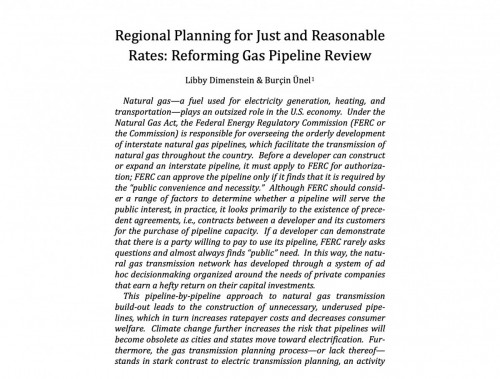Natural gas—a fuel used for electricity generation, heating, and transportation—plays an outsized role in the U.S. economy. Under the Natural Gas Act, the Federal Energy Regulatory Commission (FERC or the Commission) is responsible for overseeing the orderly development of interstate natural gas pipelines, which facilitate the transmission of natural gas throughout the country. Before a developer can construct or expand an interstate pipeline, it must apply to FERC for authorization; FERC can approve the pipeline only if it finds that it is required by the “public convenience and necessity.” Although FERC should consider a range of factors to determine whether a pipeline will serve the public interest, in practice, it looks primarily to the existence of precedent agreements, contracts between a developer and its customers for the purchase of pipeline capacity. If a developer can demonstrate that there is a party willing to pay to use its pipeline, FERC rarely asks questions and almost always finds “public” need. In this way, the natural gas transmission network has developed through a system of ad hoc decisionmaking organized around the needs of private companies that earn a hefty return on their capital investments.
This pipeline-by-pipeline approach to natural gas transmission build-out leads to the construction of unnecessary, underused pipelines, which in turn increases ratepayer costs and decreases consumer welfare. Climate change further increases the risk that pipelines will become obsolete as cities and states move toward electrification. Furthermore, the gas transmission planning process—or lack thereof—stands in stark contrast to electricity transmission planning, an activity that FERC also regulates but that is conducted by centralized entities on a regional scale. This contrast is especially confounding considering that electricity transmission is regulated under the Federal Power Act, a sister law to the Natural Gas Act with similar statutory requirements.
Relying on economic theory, legal history, and policy analysis, we make the case in this paper—pulished in the Columbia Journal of Environmental Law— for FERC’s adoption of regional gas transmission planning. We begin by describing the status quo and articulating why FERC’s current process is economically inefficient. In doing so, we draw parallels between gas and electricity transmission planning and describe how FERC treats the two activities inconsistently. We then explain why, under two provisions of the Natural Gas Act, FERC possesses both the legal authority and obligation to require regional planning. Finally, we envision how FERC might conduct gas transmission planning going forward, encouraging FERC to account for increasing electrification efforts and to plan for gas and electricity transmission in tandem.

